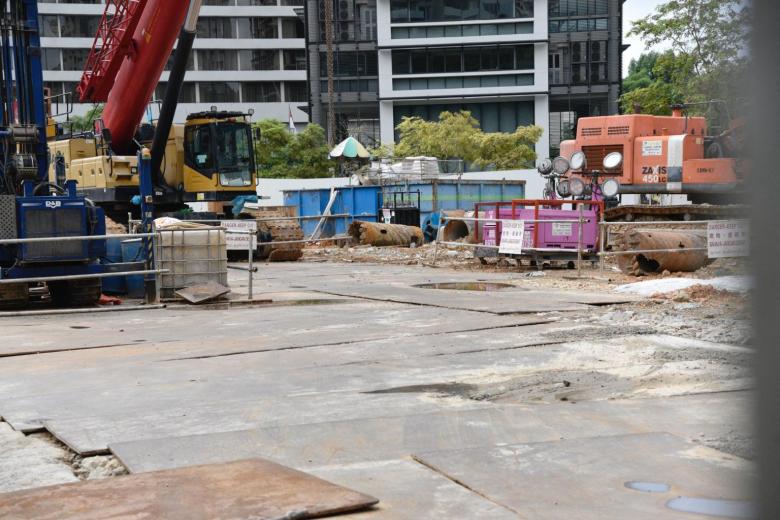SINGAPORE - As construction projects across the island have ground to a halt since the start of the circuit breaker measures about two weeks ago, residents have expressed concern that the idle worksites near their homes might now be hot spots for dengue transmission.
This is even as the country heads into the high season for dengue. Infectious diseases experts The Straits Times spoke to said the number of dengue cases is expected to peak between next month and October, as the weather turns even hotter and more humid.
Mr Tay Way Bock, 70, is one resident who is worried that four construction sites near his home in Orchard Boulevard might be potential breeding grounds for Aedes aegypti, the mosquito responsible for dengue transmission.
He told ST he had seen rainwater accumulating in various spaces at the worksite of the Park House condominium project in the past week, including skip bins used to store construction debris.
Said the retired businessman: "We're told that mosquitoes can breed in a water droplet the size of a 20-cent coin.
"When I see these big skip bins full of water, I'm immediately reminded of the risk of dengue, and wonder if NEA (National Environment Agency) is doing checks on these sites."
In response to queries, the NEA reiterated that though construction activities are suspended during the circuit breaker period, the sites are still maintaining a minimum work force on site to carry out housekeeping and vector control works.
It added: "NEA has been contacting the contractors to arrange for inspections during this period."
The agency did not respond to queries on how many construction sites have been checked so far, and how many have been found to be guilty of violations.
The Building and Construction Authority stipulates that routine pest control service must be carried out by a licensed pest control operator.
When ST visited some of the worksites of construction projects near where Mr Tay lives on Tuesday (April 21), puddles of water were pooling on the ground after a bout of rain.
Ideally, these should be pumped out immediately, said pest control experts, but the great challenge is the lack of on-site workers during the circuit breaker period.
Mr Albert Lee, director of pest management company, Hou Kit Services, said: "We cannot be at each site every day to help cover the site personnel's work."
His company checks high-risk sites, such as those located within 1km of dengue clusters, thrice a week. In between when it rains, on-site construction workers do basic maintenance such as pumping out as much stagnant water as they can, and apply anti-malarial oil.
The Singapore Contractors Association Ltd (SCAL) said that as some of the projects cover very large areas, it will be "very difficult or impossible to do a 100 per cent check on a daily basis".
Hence, contractors have to prioritise areas near residential or public areas to upkeep the site and eliminate potential breeding spots, its spokesman said.
Kajima Overseas Asia (Singapore), the main contractor for Boulevard 88, one of the sites in Orchard Boulevard, told ST it has been sending a team of six workers to carry out "essential services" on site daily since the start of the circuit breaker.
Apart from the clearing and oiling of surfaces where water has accumulated every day, the team sprays anti-mosquito chemicals on alternate days and conducts fogging once a week, said the company.
"Extra care is taken to ensure that there are no potential breeding grounds at our project site," it said, adding it will continue to take remedial measures in response to feedback.
Mr Lee said his company has conducted vector control checks for close to 100 construction sites here in the past two weeks, the same as before the circuit breaker kicked in.
It checks for stagnant water and other potential breeding areas such as water receptacles and clogged drains. It also applies NEA-approved chemicals in these areas and keeps the contractor informed of its inspection findings, he added.
Earlier this week, the NEA said there have been close to 5,800 cases of dengue fever in Singapore from January till the middle of this month - more than double the number of cases over the same period last year.
The agency warned the Republic might see the total number of cases for the year exceeding the 16,000 cases of last year, unless "immediate measures are taken to suppress the Aedes mosquito population".
The Ministry of Health (MOH) said it has been notified of five dengue deaths so far this year.
Dr Ooi Eng Eong, professor and deputy director of the Emerging Infectious Diseases Programme at the Duke-NUS Medical School, said the Aedes aegypti is well-adapted to thrive in the domestic setting.
"Now that most people are at home during the early morning and late afternoon, when the Aedes aegypti is most active in seeking a blood meal, we could be at increased risk of dengue."
Hence, preventing mosquito breeding at home is key to safeguarding against dengue, he added.
The MOH, which has been expanding the healthcare capacity to handle Covid-19-related illnesses, said most cases of dengue can be managed well at primary care clinics.
For cases requiring hospital care, there is currently sufficient capacity to manage these patients, it added.


